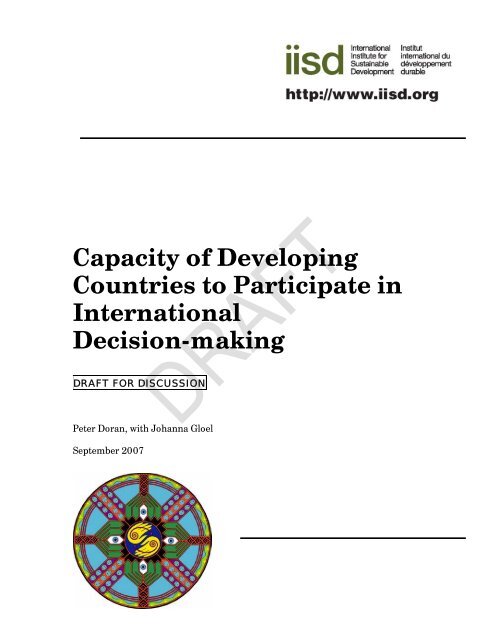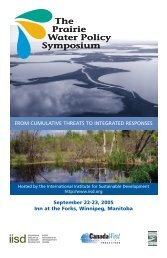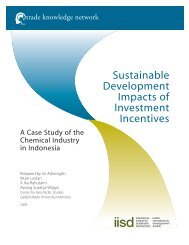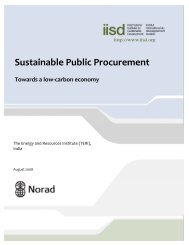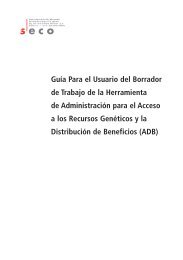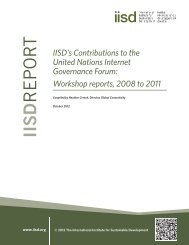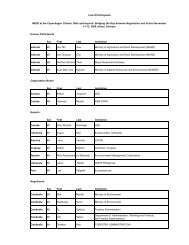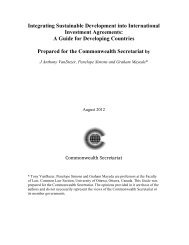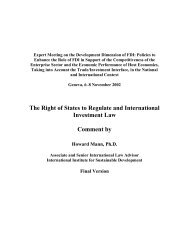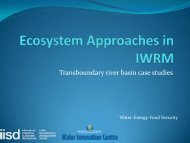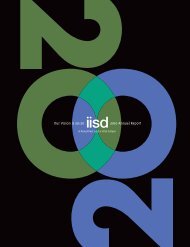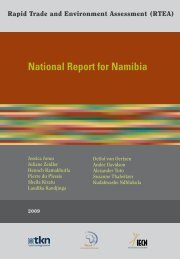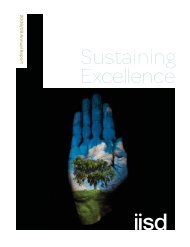Capacity of Developing Countries to Participate in International ...
Capacity of Developing Countries to Participate in International ...
Capacity of Developing Countries to Participate in International ...
You also want an ePaper? Increase the reach of your titles
YUMPU automatically turns print PDFs into web optimized ePapers that Google loves.
<strong>Capacity</strong> <strong>of</strong> <strong>Develop<strong>in</strong>g</strong><br />
<strong>Countries</strong> <strong>to</strong> <strong>Participate</strong> <strong>in</strong><br />
<strong>International</strong><br />
Decision-mak<strong>in</strong>g<br />
DRAFT FOR DISCUSSION<br />
Peter Doran, with Johanna Gloel<br />
September 2007
© 2007 <strong>International</strong> Institute for Susta<strong>in</strong>able Development (IISD)<br />
Published by the <strong>International</strong> Institute for Susta<strong>in</strong>able Development<br />
The <strong>International</strong> Institute for Susta<strong>in</strong>able Development contributes <strong>to</strong> susta<strong>in</strong>able<br />
development by advanc<strong>in</strong>g policy recommendations on <strong>in</strong>ternational trade and <strong>in</strong>vestment,<br />
economic policy, climate change, measurement and assessment, and natural resources<br />
management. Through the Internet, we report on <strong>in</strong>ternational negotiations and share<br />
knowledge ga<strong>in</strong>ed through collaborative projects with global partners, result<strong>in</strong>g <strong>in</strong> more<br />
rigorous research, capacity build<strong>in</strong>g <strong>in</strong> develop<strong>in</strong>g countries and better dialogue between<br />
North and South.<br />
IISD’s vision is better liv<strong>in</strong>g for all—susta<strong>in</strong>ably; its mission is <strong>to</strong> champion <strong>in</strong>novation,<br />
enabl<strong>in</strong>g societies <strong>to</strong> live susta<strong>in</strong>ably. IISD is registered as a charitable organization <strong>in</strong> Canada<br />
and has 501(c)(3) status <strong>in</strong> the United States. IISD receives core operat<strong>in</strong>g support from the<br />
Government <strong>of</strong> Canada, provided through the Canadian <strong>International</strong> Development Agency<br />
(CIDA), the <strong>International</strong> Development Research Centre (IDRC) and Environment Canada;<br />
and from the Prov<strong>in</strong>ce <strong>of</strong> Mani<strong>to</strong>ba. The <strong>in</strong>stitute receives project fund<strong>in</strong>g from numerous<br />
governments <strong>in</strong>side and outside Canada, United Nations agencies, foundations and the<br />
private sec<strong>to</strong>r.<br />
<strong>International</strong> Institute for Susta<strong>in</strong>able Development<br />
161 Portage Avenue East, 6th Floor<br />
W<strong>in</strong>nipeg, Mani<strong>to</strong>ba<br />
Canada R3B 0Y4<br />
Tel: +1 (204) 958-7700<br />
Fax: +1 (204) 958-7710<br />
E-mail: <strong>in</strong>fo@iisd.ca<br />
Web site: http://www.iisd.org/<br />
<strong>Capacity</strong> <strong>of</strong> <strong>Develop<strong>in</strong>g</strong> <strong>Countries</strong> <strong>to</strong> <strong>Participate</strong> <strong>in</strong> <strong>International</strong> Decision-mak<strong>in</strong>g<br />
By Peter Doran (with Johanna Gloel)<br />
September 2007
Table <strong>of</strong> Contents<br />
Table <strong>of</strong> Contents...............................................................................................................................................................................3<br />
Introduction: earth, power, knowledge.....................................................................................................................................4<br />
Overview <strong>of</strong> issues and responses: before, dur<strong>in</strong>g and after negotiations..................................................................5<br />
Issues before negotiations.........................................................................................................................................................6<br />
Issues dur<strong>in</strong>g negotiations......................................................................................................................................................11<br />
Issues after negotiations..........................................................................................................................................................11<br />
Deliver<strong>in</strong>g capacity build<strong>in</strong>g ........................................................................................................................................................12<br />
Conclusion..........................................................................................................................................................................................13<br />
Responses <strong>to</strong> capacity build<strong>in</strong>g needs...............................................................................................................................15<br />
Annex I: Selected capacity build<strong>in</strong>g programmes and contact details.......................................................................17<br />
Annex II: Composition <strong>of</strong> delegations at selected negotiations..................................................................................23<br />
Annex III: Contacts........................................................................................................................................................................24<br />
"The globe is one, but the earth is not."<br />
(Brundtland Commission, 1987)<br />
<strong>Capacity</strong> <strong>of</strong> <strong>Develop<strong>in</strong>g</strong> <strong>Countries</strong> <strong>to</strong> <strong>Participate</strong> <strong>in</strong> <strong>International</strong> Decision-mak<strong>in</strong>g – DRAFT 3
Introduction: Earth, power, knowledge<br />
This scop<strong>in</strong>g paper identifies some <strong>of</strong> the epistemological, process and policy issues<br />
associated with the question <strong>of</strong> negotiat<strong>in</strong>g capacity <strong>in</strong> develop<strong>in</strong>g countries <strong>in</strong> the<br />
context <strong>of</strong> <strong>in</strong>ternational governance and multilateral agreements for susta<strong>in</strong>able<br />
development.<br />
The marg<strong>in</strong>alization <strong>of</strong> develop<strong>in</strong>g countries (and civil society) from multilateral<br />
processes has been described by Fisher and Green 1 as one <strong>of</strong> disenfranchisement:<br />
Be<strong>in</strong>g deprived <strong>of</strong> the capability <strong>to</strong> participate and <strong>to</strong> <strong>in</strong>fluence agenda-sett<strong>in</strong>g and<br />
decision-mak<strong>in</strong>g <strong>in</strong> <strong>in</strong>ternational regimes for susta<strong>in</strong>able development.<br />
Fisher and Green (2004) have described the three dimensions <strong>of</strong> disenfranchisement or<br />
sources <strong>of</strong> <strong>in</strong>capacity. The first is “Endogenous” and consists <strong>of</strong> those fac<strong>to</strong>rs that<br />
perta<strong>in</strong> <strong>to</strong> a country or region itself, notably fac<strong>to</strong>rs <strong>of</strong> tra<strong>in</strong><strong>in</strong>g, people, knowledge,<br />
government and bureaucracy. The characteristics <strong>of</strong> a national government and its<br />
stability can act <strong>to</strong> <strong>in</strong>hibit effective participation. Secondly, “Transnational Connectivity”,<br />
which expla<strong>in</strong>s the means through which disenfranchised ac<strong>to</strong>rs obta<strong>in</strong> and circulate<br />
<strong>in</strong>formation and promotes engagement <strong>in</strong> and understand<strong>in</strong>g <strong>of</strong> <strong>in</strong>ternational policy<br />
mak<strong>in</strong>g. Information can range from basic technical and procedural issues <strong>to</strong> policyrelevant<br />
science and social science. Litf<strong>in</strong> (1994) 2 , for example, has argued that<br />
<strong>in</strong>fluenc<strong>in</strong>g policy-mak<strong>in</strong>g decisions is closely tied <strong>to</strong> persuad<strong>in</strong>g other ac<strong>to</strong>rs <strong>to</strong> accept a<br />
specific set <strong>of</strong> scientific facts or logic. The third dimension is “Geopolitical Status”,<br />
reflect<strong>in</strong>g the political fact that there are key political ac<strong>to</strong>rs <strong>in</strong> each <strong>in</strong>ternational regime.<br />
Key ac<strong>to</strong>rs may derive their power from money, military capability, strategic alliances,<br />
natural resources, or some comb<strong>in</strong>ation there<strong>of</strong>; and we can speculate that these sources<br />
<strong>of</strong> power are sometimes closely related with a capacity <strong>to</strong> fund and organize powerful<br />
research and th<strong>in</strong>k-tank <strong>in</strong>stitutions.<br />
Table 1. Operationaliz<strong>in</strong>g the Dimensions <strong>of</strong> Disenfranchisement. Adapted from Fisher<br />
and Green (2004)<br />
Dimension<br />
Endogenous Resources<br />
Transnational<br />
Connectivity<br />
<strong>Develop<strong>in</strong>g</strong> Country Operationalization<br />
Human resources<br />
Knowledge <strong>of</strong> English<br />
F<strong>in</strong>ancial resources<br />
Political stability and political system<br />
- Membership <strong>in</strong> epistemic communities<br />
- Interactions with scientists, academics or policy-makers<br />
from other countries<br />
1 “Understand<strong>in</strong>g Disenfranchisement: Civil Society and <strong>Develop<strong>in</strong>g</strong> <strong>Countries</strong> Influence and Participation <strong>in</strong> Global Governance for Susta<strong>in</strong>able<br />
Development”, article by Dana R Fisher and Jessica F Green, <strong>in</strong> Global Environmental Politics, 4:3 August 2004. Available at: Project Muse:<br />
http://muse.jhu.edu/journals/global_environmental_politics/v004/4.3fisher.pdf. Site visited on 13 April 2007. The def<strong>in</strong>ition <strong>of</strong><br />
disenfranchisement was developed by participants <strong>in</strong> US and Japanese roundtables <strong>in</strong> the Summer <strong>of</strong> 2003.<br />
2 Litf<strong>in</strong>, Karen T. 1994. Ozone Discourses: Science and Politics <strong>in</strong> Global Environmental Cooperation. New York, NY: Columbia University Press.<br />
<strong>Capacity</strong> <strong>of</strong> <strong>Develop<strong>in</strong>g</strong> <strong>Countries</strong> <strong>to</strong> <strong>Participate</strong> <strong>in</strong> <strong>International</strong> Decision-mak<strong>in</strong>g – DRAFT 4
Geopolitical Status<br />
- Membership/leadership <strong>in</strong> UN bodies, commissions,<br />
subsidiary bodies<br />
- Alliance and proximity <strong>of</strong> country <strong>to</strong> colonial<br />
power/superpower<br />
- Natural Resources<br />
The paper is organized <strong>in</strong> three ma<strong>in</strong> sections, sett<strong>in</strong>g out issues/programmes for<br />
decision-makers a. before, b. dur<strong>in</strong>g, and c. after negotiations. To some extent, these<br />
sections map on <strong>to</strong> the four processes or stages <strong>of</strong> multilateral negotiations (Chasek and<br />
Rajamani 2002): issue def<strong>in</strong>ition, fact-f<strong>in</strong>d<strong>in</strong>g, barga<strong>in</strong><strong>in</strong>g, and implementation and<br />
strengthen<strong>in</strong>g. Obvious challenges for develop<strong>in</strong>g countries, at each stage, <strong>in</strong>clude:<br />
i. Delegation size and composition: many develop<strong>in</strong>g countries have limited<br />
access <strong>to</strong> sufficient numbers and range <strong>of</strong> delegates <strong>to</strong> make up their<br />
delegations.<br />
ii. Proliferation <strong>of</strong> meet<strong>in</strong>gs: a related issue is the sheer number <strong>of</strong> multilateral<br />
negotiations and the demand on develop<strong>in</strong>g country governments <strong>to</strong> service<br />
them.<br />
The challenge <strong>of</strong> creat<strong>in</strong>g a level play<strong>in</strong>g field, however, raises issues beyond those <strong>of</strong><br />
capacity <strong>to</strong> participate. The paper treats “knowledge” itself as a (geo)political concept,<br />
which is always implicated <strong>in</strong> formations <strong>of</strong> power and governmentality 3 . The challenge<br />
for develop<strong>in</strong>g country negotia<strong>to</strong>rs is not merely <strong>to</strong> achieve a “level play<strong>in</strong>g field”<br />
through access <strong>to</strong> technical pr<strong>of</strong>iciency <strong>in</strong> basic skills, from language competencies <strong>to</strong><br />
negotiat<strong>in</strong>g techniques. Their challenge is also <strong>to</strong> recognize and address the fact that that<br />
knowledge production and capacity build<strong>in</strong>g opportunities are (supposedly outside the<br />
formal multilateral negotiat<strong>in</strong>g processes are) already embedded <strong>in</strong> a wider contest over<br />
mean<strong>in</strong>g and power <strong>in</strong> the global community. This raises questions about who is<br />
provid<strong>in</strong>g or fund<strong>in</strong>g capacity build<strong>in</strong>g support and <strong>in</strong> whose <strong>in</strong>terest? For example, Haas<br />
(2001) has observed that non democratic develop<strong>in</strong>g countries are unlikely <strong>to</strong> be affected<br />
by build<strong>in</strong>g national concern. The pr<strong>in</strong>cipal form <strong>of</strong> leverage over LDCs by <strong>in</strong>ternational<br />
<strong>in</strong>stitutions is through capacity build<strong>in</strong>g, and the exercise <strong>of</strong> conditionality by sources <strong>of</strong><br />
aid and <strong>in</strong>vestment 4 .<br />
Overview <strong>of</strong> issues and responses: Before, dur<strong>in</strong>g and after<br />
negotiations<br />
3 "Governmentality" applies <strong>to</strong> a variety <strong>of</strong> his<strong>to</strong>rical periods and <strong>to</strong> different specific power regimes. However, it is <strong>of</strong>ten used <strong>in</strong> reference <strong>to</strong><br />
"neoliberal governmentality", i.e., <strong>to</strong> a type <strong>of</strong> governmentality that characterizes advanced liberal democracies. In this case, the notion <strong>of</strong><br />
governmentality refers <strong>to</strong> societies where power is de-centered and its members play an active role <strong>in</strong> their own self-government, e.g. as posited <strong>in</strong><br />
neoliberalism. Because <strong>of</strong> its active role, <strong>in</strong>dividuals need <strong>to</strong> be regulated from “<strong>in</strong>side”. A particular form <strong>of</strong> governmentality is characterized by a<br />
certa<strong>in</strong> form <strong>of</strong> knowledge ("savoir" <strong>in</strong> French). In the case <strong>of</strong> neoliberal governmentality (a k<strong>in</strong>d <strong>of</strong> governmentality based on the predom<strong>in</strong>ance <strong>of</strong><br />
market mechanisms and <strong>of</strong> the restriction <strong>of</strong> the action <strong>of</strong> the state) the knowledge produced allows the construction <strong>of</strong> au<strong>to</strong>-regulated or au<strong>to</strong>correct<strong>in</strong>g<br />
selves.<br />
4 Haas, 2001, “Lessons from Environmental Governance for Debt Forgiveness .” A version was published <strong>in</strong> John Ikenberry and Vit<strong>to</strong>rio<br />
Parsi eds.2001 Manuale di Relazioni Internazionale Rome: Gius, Laterza & Figlie.<br />
<strong>Capacity</strong> <strong>of</strong> <strong>Develop<strong>in</strong>g</strong> <strong>Countries</strong> <strong>to</strong> <strong>Participate</strong> <strong>in</strong> <strong>International</strong> Decision-mak<strong>in</strong>g – DRAFT 5
Chasek and Rajamani (2002) have identified a number <strong>of</strong> common strategies adopted by<br />
develop<strong>in</strong>g countries <strong>to</strong> compensate for some <strong>of</strong> the <strong>in</strong>herent weaknesses they br<strong>in</strong>g <strong>to</strong><br />
the table. These are: a. coalition build<strong>in</strong>g; b. priority sett<strong>in</strong>g; c. pool<strong>in</strong>g expertise; d. prenegotiation<br />
brief<strong>in</strong>g and tra<strong>in</strong><strong>in</strong>g; and e. alliance build<strong>in</strong>g with non-state ac<strong>to</strong>rs e.g.,<br />
NGOs.<br />
Issues before negotiations<br />
In the run up <strong>to</strong> negotiations, develop<strong>in</strong>g countries are <strong>of</strong>ten faced with a number <strong>of</strong><br />
basic obstacles, <strong>in</strong>clud<strong>in</strong>g:<br />
- Low skills capacity <strong>in</strong> the generic techniques <strong>of</strong> negotiation;<br />
- Limited access <strong>to</strong> expert knowledge <strong>in</strong> the field <strong>of</strong> <strong>in</strong>ternational law;<br />
- Limited availability <strong>of</strong> issue-based knowledge and expertise, especially where<br />
diplomats have been follow<strong>in</strong>g or pursu<strong>in</strong>g negotiations on behalf <strong>of</strong> a country;<br />
- The related problem <strong>of</strong> not hav<strong>in</strong>g a prior and agreed policy position on an issue;<br />
and<br />
- A limited grasp <strong>of</strong> the most important issues perta<strong>in</strong><strong>in</strong>g <strong>to</strong> a particular develop<strong>in</strong>g<br />
country or its region.<br />
The growth <strong>in</strong> the complexity and <strong>in</strong>creased regularity <strong>of</strong> negotiations, <strong>in</strong> climate change<br />
for example, has exacerbated issues around capacity for many develop<strong>in</strong>g countries.<br />
A lack <strong>of</strong> human resources sometimes results <strong>in</strong> develop<strong>in</strong>g country negotia<strong>to</strong>rs miss<strong>in</strong>g<br />
vital pre-negotiations meet<strong>in</strong>gs. The negotia<strong>to</strong>rs can miss out on critical discussions—and<br />
opportunities <strong>to</strong> impact on agenda sett<strong>in</strong>g, issue def<strong>in</strong>ition, fact f<strong>in</strong>d<strong>in</strong>g, and prelim<strong>in</strong>ary<br />
barga<strong>in</strong><strong>in</strong>g. Negotia<strong>to</strong>rs also need early exposure <strong>to</strong> meet<strong>in</strong>gs if they are <strong>to</strong> pick up the<br />
rules and “l<strong>in</strong>go” <strong>of</strong> the discussions. Consistency <strong>in</strong> the make-up <strong>of</strong> delegations can also<br />
be a problem over time, where membership changes accord<strong>in</strong>g <strong>to</strong> the location and<br />
frequency <strong>of</strong> negotiations. This underm<strong>in</strong>es a country’s ability <strong>to</strong> build up networks and<br />
personal contacts that can play an important role <strong>in</strong> build<strong>in</strong>g expertise and allies.<br />
Timely regional meet<strong>in</strong>gs can be useful for pre-negotiation sessions, provid<strong>in</strong>g<br />
opportunities for coord<strong>in</strong>ation and strategy sessions.<br />
Where countries engage external assistance, <strong>in</strong>clud<strong>in</strong>g the services <strong>of</strong> NGOs, science<br />
centres, or <strong>in</strong>dependent <strong>in</strong>ternational consultants, there is a risk <strong>of</strong> substitution rather<br />
than build<strong>in</strong>g capacity. <strong>Develop<strong>in</strong>g</strong> countries also have <strong>to</strong> be aware <strong>of</strong> the <strong>in</strong>troduction <strong>of</strong><br />
value judgements that do not necessarily serve the <strong>in</strong>terests <strong>of</strong> their own negotiat<strong>in</strong>g<br />
positions. There is no substitute for rigorous policy analysis led by the <strong>in</strong>terested party.<br />
Some <strong>of</strong> the organizations <strong>of</strong>fer<strong>in</strong>g programmes that address some <strong>of</strong> the pre-negotiation<br />
issues, are set out <strong>in</strong> Table 2.<br />
<strong>Capacity</strong> <strong>of</strong> <strong>Develop<strong>in</strong>g</strong> <strong>Countries</strong> <strong>to</strong> <strong>Participate</strong> <strong>in</strong> <strong>International</strong> Decision-mak<strong>in</strong>g – DRAFT 6
Table 2: Selected tra<strong>in</strong><strong>in</strong>g <strong>in</strong>terventions<br />
Support Organization Programme Outputs Document Contact<br />
FIELD AOSIS Help with set up.<br />
Offers support before,<br />
dur<strong>in</strong>g and between<br />
negotiations<br />
FIELD+World Bank<br />
FIELD + IIED<br />
FIELD<br />
FIELD + UNCTAD<br />
ECBI<br />
ECBI<br />
National and Regional<br />
capacity <strong>in</strong> East Africa<br />
CB Workshop for<br />
junior Climate Change<br />
Negotia<strong>to</strong>rs<br />
Strengthen<strong>in</strong>g<br />
Implementation and<br />
negotiation capacity<br />
(CC and Biodiversity)<br />
CB for improved<br />
policy mak<strong>in</strong>g and<br />
negotiation on key<br />
trade and environment<br />
issues<br />
Oxford Fellowship<br />
Programme for lead<strong>in</strong>g<br />
negotia<strong>to</strong>rs<br />
Bursaries for<br />
attendance at<br />
UNFCCC sessions<br />
Policy-mak<strong>in</strong>g and<br />
negotiations<br />
Regional preparation<br />
workshops, negotiation<br />
tra<strong>in</strong><strong>in</strong>g, workshop for<br />
national and regional<br />
coord<strong>in</strong>ation<br />
Regional meet<strong>in</strong>gs<br />
Trust build<strong>in</strong>g and<br />
work<strong>in</strong>g relationships<br />
outside <strong>of</strong>ficial<br />
negotiations<br />
Attendance at<br />
UNFCCC sessions<br />
ECBI Workshop programme Issues and negotiation<br />
skills, regional, enable<br />
<strong>to</strong> divide tasks among<br />
group/coalition<br />
ECBI Junior Bursaries Enable <strong>to</strong> take part <strong>in</strong><br />
workshops<br />
ECBI<br />
Regional annual<br />
Workshop<br />
Network<strong>in</strong>g between<br />
regions<br />
ECBI Policy Analysis Enhance analytic<br />
capacity, formulation<br />
<strong>of</strong> common positions<br />
with<strong>in</strong> coalitions,<br />
analysis <strong>of</strong> burdens and<br />
benefits associated with<br />
politics<br />
ICTSD<br />
UNITAR and IPU<br />
UNITAR<br />
Southern Agenda on<br />
Trade and<br />
Environment<br />
Global <strong>Capacity</strong><br />
Build<strong>in</strong>g Initiative for<br />
Parliaments on SD<br />
Climate Change<br />
Programme<br />
Reference Tool and<br />
Guide for negotia<strong>to</strong>rs<br />
and policy makers<br />
Resources <strong>to</strong> enhance<br />
<strong>in</strong>volvement <strong>in</strong><br />
negotiation <strong>of</strong> MEAs,<br />
identification <strong>of</strong><br />
country priorities <strong>in</strong><br />
MEA negotiations, and<br />
support for enhanced<br />
role <strong>of</strong> parliaments<br />
Regional tra<strong>in</strong><strong>in</strong>g,<br />
onl<strong>in</strong>e platform<br />
Trade and<br />
Environment<br />
Resource Book<br />
Who needs <strong>to</strong> do<br />
what <strong>to</strong><br />
M J Mace, Programme Direc<strong>to</strong>r, Climate<br />
Change and Energy, Field<br />
Mj.mace@field.org.uk<br />
UNITAR<br />
Multilateral Diplomacy<br />
and <strong>International</strong><br />
Affairs Management e-<br />
Onl<strong>in</strong>e course for<br />
diplomats and people<br />
active <strong>in</strong> multilateral<br />
implement the<br />
Kyo<strong>to</strong> Pro<strong>to</strong>col. An<br />
assessment <strong>of</strong><br />
capacity build<strong>in</strong>g<br />
needs <strong>in</strong> 33 DCs.<br />
Climate Change<br />
(CC) and <strong>in</strong>ternet<br />
support.<br />
<strong>Develop<strong>in</strong>g</strong> human<br />
and <strong>in</strong>stitutional<br />
capacity <strong>to</strong> address<br />
CC issues <strong>in</strong> LDCs<br />
<strong>Capacity</strong> <strong>of</strong> <strong>Develop<strong>in</strong>g</strong> <strong>Countries</strong> <strong>to</strong> <strong>Participate</strong> <strong>in</strong> <strong>International</strong> Decision-mak<strong>in</strong>g – DRAFT 7
learn<strong>in</strong>g web site conferences<br />
CCKN Climate Compendium Guide <strong>to</strong> issues and<br />
ac<strong>to</strong>rs, build<strong>in</strong>g<br />
knowledge<br />
CCKN Negotiation Guide Survival guide for DC<br />
Climate Negotia<strong>to</strong>rs<br />
IISD + ENDA-<br />
ENERGIE<br />
Cambio Global<br />
Climate Change<br />
<strong>Capacity</strong> Project Africa<br />
Courses <strong>to</strong> build local<br />
Knowledge about CC,<br />
implications for Africa<br />
, negotiation skills,<br />
facilitat<strong>in</strong>g work<strong>in</strong>g<br />
<strong>to</strong>gether, <strong>in</strong>tersessional<br />
meet<strong>in</strong>gs.<br />
“On behalf <strong>of</strong> My<br />
Delegation”,<br />
by Joyeeta Gupta<br />
UNFCCC & other<br />
conventions<br />
UNEP + UNCTAD<br />
capacity<br />
All <strong>in</strong>formation<br />
concern<strong>in</strong>g the<br />
conferences<br />
CBTF, <strong>Capacity</strong><br />
Build<strong>in</strong>g Task Force.<br />
WTO and MEA<br />
issues.<br />
Thematic research,<br />
tra<strong>in</strong><strong>in</strong>g, network<strong>in</strong>g,<br />
br<strong>in</strong>g<strong>in</strong>g people<br />
<strong>to</strong>gether from the trade<br />
and environment fields<br />
Documents on<br />
<strong>Capacity</strong> Build<strong>in</strong>g<br />
Andrew.stevenson@unctad.org<br />
IIED/FIELD<br />
supported by DFID<br />
SACEP +FIELD<br />
IUCN/RBP<br />
Climate Negotiations<br />
tra<strong>in</strong><strong>in</strong>g<br />
Workshop on<br />
Negotiation<br />
<strong>Capacity</strong> Build<strong>in</strong>g and<br />
decision-mak<strong>in</strong>g and<br />
various levels<br />
For LDCs<br />
IUCN/RBP<br />
Organis<strong>in</strong>g national<br />
prepara<strong>to</strong>ry sessions,<br />
promote discussions<br />
and debate<br />
IUCN/RBP<br />
UNEP and Secretariat<br />
<strong>of</strong> the Pacific Regional<br />
Environment<br />
programme (SPREP)<br />
Ian Fry, Tuvalu<br />
<strong>International</strong><br />
Environmental Officer<br />
WWF South Pacific<br />
(with EU fund<strong>in</strong>g)<br />
Knowledge on Climate<br />
Change and<br />
Biodiversity<br />
Pacific regional<br />
workshops on<br />
negotiation tra<strong>in</strong><strong>in</strong>g.<br />
Booklet PINPASS<br />
Pacific Islands<br />
Negotiation Passport<br />
Coord<strong>in</strong>ation<br />
<strong>of</strong> negotiations<br />
tra<strong>in</strong><strong>in</strong>g<br />
Tra<strong>in</strong><strong>in</strong>g for<br />
representatives from<br />
Marshall Islands,<br />
Federated States <strong>of</strong><br />
Micronesia and Fiji.<br />
H<strong>in</strong>ts on negotiations<br />
Tra<strong>in</strong><strong>in</strong>g for govt.<br />
<strong>of</strong>ficial s from Tuvalu<br />
and Cook Islands.<br />
Ian Fry, <strong>International</strong> Environmental Officer,<br />
Department <strong>of</strong> Environment, Tuvalu<br />
ianfry@envtuvalu.net<br />
<strong>Capacity</strong> <strong>of</strong> <strong>Develop<strong>in</strong>g</strong> <strong>Countries</strong> <strong>to</strong> <strong>Participate</strong> <strong>in</strong> <strong>International</strong> Decision-mak<strong>in</strong>g – DRAFT 8
Issues dur<strong>in</strong>g negotiations<br />
The challenges for develop<strong>in</strong>g country negotia<strong>to</strong>rs dur<strong>in</strong>g negotiation sessions derive from<br />
the limited size <strong>of</strong> some delegations, result<strong>in</strong>g <strong>in</strong> an <strong>in</strong>ability <strong>to</strong> keep up with all the<br />
relevant formal and <strong>in</strong>formal meet<strong>in</strong>gs, and the challenge <strong>of</strong> absorb<strong>in</strong>g all the relevant<br />
documentation. The climate negotiations, for example, pose particular problems given<br />
the quantity <strong>of</strong> sometimes complex documentation, and the cont<strong>in</strong>uous nature <strong>of</strong> the<br />
negotiations.<br />
Some negotiat<strong>in</strong>g teams compensate for their lack <strong>of</strong> capacity by tak<strong>in</strong>g <strong>to</strong> the<br />
“corridors” and network<strong>in</strong>g, <strong>to</strong> establish what has taken place <strong>in</strong> some <strong>in</strong>formal sessions<br />
(<strong>of</strong>ten without translation facilities). Some well chosen NGO representatives are used as<br />
<strong>in</strong>telligence sources, as are allies <strong>in</strong> other delegations who share an <strong>in</strong>terest <strong>in</strong> certa<strong>in</strong><br />
issues under discussion.<br />
Meet<strong>in</strong>gs <strong>of</strong> the G-77/Ch<strong>in</strong>a or other coalitions and regional group<strong>in</strong>gs can also be a<br />
source <strong>of</strong> updates. South-South coalitions such as the G-77/Ch<strong>in</strong>a and AOSIS br<strong>in</strong>g<br />
their own challenges. Compet<strong>in</strong>g <strong>in</strong>terests and agenda capture by dom<strong>in</strong>ant <strong>in</strong>terest<br />
groups count among the most obvious weaknesses with<strong>in</strong> the G-77/Ch<strong>in</strong>a. Coalitions<br />
are most cohesive and effective across the board when they are homogenous, and share a<br />
his<strong>to</strong>ry and some sense <strong>of</strong> identity.<br />
Table 3 sets out some <strong>of</strong> the programmes address<strong>in</strong>g <strong>in</strong>-session challenges.<br />
Table 3: Address<strong>in</strong>g <strong>in</strong>-session negotiation challenges<br />
Organization Programme What they do Document Contact<br />
FIELD AOSIS Brief<strong>in</strong>g material,<br />
<strong>in</strong>formation, draft<strong>in</strong>g<br />
<strong>of</strong> submissions and<br />
<strong>in</strong>terventions<br />
FIELD Side event WSSD Brief<strong>in</strong>g, assistance,<br />
preparation <strong>of</strong><br />
submissions<br />
ECBI Mobile Phones For LCD dur<strong>in</strong>g<br />
negotiations<br />
IISD Earth Negotiation Bullet<strong>in</strong> Daily summary and<br />
analysis <strong>of</strong> meet<strong>in</strong>gs,<br />
available <strong>in</strong> paper and<br />
electronic format.<br />
Issues after negotiations<br />
The challenges that follow a negotiation session or completion <strong>of</strong> a negotiation <strong>in</strong>clude<br />
accurate debrief<strong>in</strong>g <strong>of</strong> those with<strong>in</strong> and outside government who need <strong>to</strong> know,<br />
implementation and communication with civil society.<br />
Organization Programme What they do Document Contact<br />
UNITAR and IPU Global <strong>Capacity</strong><br />
Build<strong>in</strong>g Initiative for<br />
Parliaments on SD<br />
Support with<br />
implementation <strong>of</strong><br />
laws<br />
LDCEG<br />
Advice <strong>to</strong> LCDs on<br />
preparation and<br />
implementation <strong>of</strong><br />
national adaptation<br />
programmes<br />
<strong>Capacity</strong> <strong>of</strong> <strong>Develop<strong>in</strong>g</strong> <strong>Countries</strong> <strong>to</strong> <strong>Participate</strong> <strong>in</strong> <strong>International</strong> Decision-mak<strong>in</strong>g: – DRAFT 11
SACEP<br />
Facilitation ratification<br />
and implementation<br />
IUCN/RBP<br />
Implement Convention<br />
on Biological Diversity<br />
UNEP MEA Synergies <strong>Capacity</strong> build<strong>in</strong>g <strong>to</strong><br />
reduce poverty<br />
through synergistic<br />
implementation <strong>of</strong><br />
Rio MEAs<br />
UNCTAD/UNEP Policy Coord<strong>in</strong>ation Enhanc<strong>in</strong>g Policy<br />
Co-ord<strong>in</strong>ation on<br />
Trade and<br />
Environment issues;<br />
MEAs and traderelated<br />
measures<br />
Andrew.stevenson@unctad.org<br />
Deliver<strong>in</strong>g capacity build<strong>in</strong>g<br />
A sampl<strong>in</strong>g <strong>of</strong> tra<strong>in</strong><strong>in</strong>g delivered <strong>to</strong> develop<strong>in</strong>g country negotia<strong>to</strong>rs <strong>in</strong>cluded an<br />
experience from a workshop <strong>in</strong> Africa, delivered by Kallhauge Gupta. The workshop<br />
drew speakers and facilita<strong>to</strong>rs from African countries and was closed <strong>to</strong> non-negotia<strong>to</strong>rs.<br />
The needs <strong>of</strong> participants were identified, <strong>in</strong>clud<strong>in</strong>g tra<strong>in</strong><strong>in</strong>g <strong>in</strong> negotiation skills,<br />
enhanced understand<strong>in</strong>g <strong>of</strong> the issues, and approaches <strong>to</strong> resolv<strong>in</strong>g <strong>in</strong>ternal differences.<br />
The workshop addressed negotiation theory and <strong>to</strong>ols, constra<strong>in</strong>ts on negotia<strong>to</strong>rs<br />
prepar<strong>in</strong>g <strong>to</strong> participate <strong>in</strong> negotiations, an analysis <strong>of</strong> stakeholder positions, a review <strong>of</strong><br />
the <strong>in</strong>ternal dynamics and politics <strong>of</strong> the G-77/Ch<strong>in</strong>a, and a review <strong>of</strong> the f<strong>in</strong>ancial and<br />
adm<strong>in</strong>istrative aspects <strong>of</strong> UN negotiations and issue l<strong>in</strong>kages across MEAs. Chasek and<br />
Rajamani (2002) have recommended a menu <strong>of</strong> support measures for develop<strong>in</strong>g country<br />
negotia<strong>to</strong>rs, <strong>in</strong>clud<strong>in</strong>g:<br />
- Participation Funds;<br />
- More regional prepara<strong>to</strong>ry meet<strong>in</strong>gs for network<strong>in</strong>g, trust build<strong>in</strong>g and form<strong>in</strong>g<br />
<strong>of</strong> common positions;<br />
- More technology/ access <strong>to</strong> computers and the <strong>in</strong>ternet <strong>to</strong> conduct research and<br />
stay <strong>in</strong> contact with others;<br />
- Diplomatic tra<strong>in</strong><strong>in</strong>g and support for learn<strong>in</strong>g about relevant issues, especially with<br />
regard <strong>to</strong> particular country perspectives and <strong>in</strong>terests;<br />
- Improve timel<strong>in</strong>e and quality <strong>of</strong> conference documentation (<strong>in</strong> all languages);<br />
- Strengthen<strong>in</strong>g <strong>of</strong> policy analysis and long-term development <strong>of</strong> positions;<br />
- More systematic support from convention or UN secretariats; and<br />
- Changes <strong>in</strong> structure and process <strong>of</strong> negotiations.<br />
Chasek and Rajamani (2002) also outl<strong>in</strong>e the conditions for a “perfect negotiation”,<br />
<strong>in</strong>clud<strong>in</strong>g:<br />
- Negotia<strong>to</strong>rs adequately tra<strong>in</strong>ed <strong>in</strong> negotiation skills, with <strong>in</strong>-depth knowledge <strong>of</strong><br />
<strong>to</strong>pics and knowledge <strong>of</strong> connections with other MEAs;<br />
- Familiarity with national and regional policy regard<strong>in</strong>g needs, benefits <strong>of</strong> country<br />
(established through open discussion at home with civic society and parliament;<br />
<strong>in</strong>formed public);<br />
- Established coalitions with and trust <strong>in</strong> negotia<strong>to</strong>rs from countries with similar<br />
<strong>in</strong>terests <strong>in</strong> an issue, and with a similar economic status;<br />
<strong>Capacity</strong> <strong>of</strong> <strong>Develop<strong>in</strong>g</strong> <strong>Countries</strong> <strong>to</strong> <strong>Participate</strong> <strong>in</strong> <strong>International</strong> Decision-mak<strong>in</strong>g: – DRAFT 12
- Sufficient numbers <strong>of</strong> people <strong>to</strong> go <strong>to</strong> negotiations, and ma<strong>in</strong>ta<strong>in</strong> reasonable<br />
consistency <strong>of</strong> membership <strong>in</strong> negotiation teams;<br />
- A division <strong>of</strong> labour across negotiat<strong>in</strong>g coalitions; and sufficient plann<strong>in</strong>g <strong>to</strong><br />
ensure representation <strong>of</strong> the coalition at all formal and <strong>in</strong>formal meet<strong>in</strong>gs;<br />
- Brief<strong>in</strong>gs for delegations, coalitions, and from NGOs; access <strong>to</strong> ENB and<br />
associated IISD RS products;<br />
- In-house capacity for negotia<strong>to</strong>rs <strong>to</strong> negotiate their own country’s positions;<br />
- Regular debrief<strong>in</strong>gs at home <strong>to</strong> parliament and civil society;<br />
- Implementation <strong>of</strong> MEA <strong>in</strong> national law and education;<br />
- Regular contact with members <strong>of</strong> coalitions;<br />
- Regional <strong>in</strong>ter-sessional meet<strong>in</strong>gs; and<br />
- An ability <strong>to</strong> keep up <strong>to</strong> date with and apply scientific and other policy research<br />
on negotiat<strong>in</strong>g <strong>to</strong>pics.<br />
Programmes deemed most helpful <strong>to</strong> negotia<strong>to</strong>rs from develop<strong>in</strong>g countries have a<br />
number <strong>of</strong> characteristics:<br />
- The capacity build<strong>in</strong>g organizations accompany negotia<strong>to</strong>rs from the beg<strong>in</strong>n<strong>in</strong>g<br />
<strong>of</strong> the preparations through <strong>to</strong> the negotiations and conduct follow-up sessions<br />
afterwards (e.g., FIELD- AOSIS);<br />
- Support and tra<strong>in</strong><strong>in</strong>g for countries is designed <strong>to</strong> enable the subjects <strong>of</strong> the<br />
tra<strong>in</strong><strong>in</strong>g <strong>to</strong> develop au<strong>to</strong>nomously, with sufficient confidence and skills <strong>to</strong> get on<br />
with their own policy discussions; space is provided at workshops for participants<br />
<strong>to</strong> communicate with each other and <strong>in</strong> the absence <strong>of</strong> the tra<strong>in</strong>ers;<br />
- Onl<strong>in</strong>e forums are made available <strong>to</strong> ensure that newly tra<strong>in</strong>ed negotia<strong>to</strong>rs can<br />
keep <strong>in</strong> <strong>to</strong>uch, and obta<strong>in</strong> updated <strong>in</strong>formation;<br />
- Workshops are organized on a regional basis, help<strong>in</strong>g participants <strong>to</strong> identify<br />
common or similar positions from an identifiable perspective; this aids trust<br />
build<strong>in</strong>g and network<strong>in</strong>g;<br />
- Programmes <strong>in</strong>tegrate understand<strong>in</strong>g <strong>of</strong> MEA issues with anti-poverty strategies;<br />
and<br />
- Bursaries are provided <strong>to</strong> help send more than one person from each<br />
participat<strong>in</strong>g country.<br />
Occasional obstacles <strong>to</strong> successful workshops and tra<strong>in</strong><strong>in</strong>g result from the tim<strong>in</strong>g <strong>of</strong><br />
workshops, <strong>to</strong>o close <strong>to</strong> the commencement <strong>of</strong> a negotiation; dysfunction with<strong>in</strong> the G-<br />
77/Ch<strong>in</strong>a; and failure <strong>to</strong> identify clear l<strong>in</strong>kages and priorities associated with MEAs and<br />
national anti-poverty strategies.<br />
Conclusion<br />
<strong>Capacity</strong> build<strong>in</strong>g for develop<strong>in</strong>g country negotia<strong>to</strong>rs can address a wide spectrum <strong>of</strong><br />
needs, rang<strong>in</strong>g from basic language skills <strong>to</strong> sensitive policy analyses support and direct<br />
<strong>in</strong>put <strong>to</strong> the preparation <strong>of</strong> regional positions <strong>to</strong> be advanced dur<strong>in</strong>g negotiations.<br />
As with <strong>in</strong>ternational negotiations and agenda sett<strong>in</strong>g processes, those who set the<br />
question and the frame for discussion, <strong>of</strong>ten come out on <strong>to</strong>p. The way <strong>in</strong> which we<br />
def<strong>in</strong>e capacity build<strong>in</strong>g as a problem can also <strong>in</strong>fluence the way <strong>in</strong> which we come up<br />
with solutions. <strong>Capacity</strong> build<strong>in</strong>g can be approached from an epistemological, process or<br />
<strong>Capacity</strong> <strong>of</strong> <strong>Develop<strong>in</strong>g</strong> <strong>Countries</strong> <strong>to</strong> <strong>Participate</strong> <strong>in</strong> <strong>International</strong> Decision-mak<strong>in</strong>g: – DRAFT 13
policy perspective; and the solutions and remedies advocated will <strong>of</strong>ten reflect our<br />
start<strong>in</strong>g po<strong>in</strong>t.<br />
The use <strong>of</strong> the word “capacity” can suggest that the gap <strong>in</strong> the ability <strong>of</strong> a develop<strong>in</strong>g<br />
country represents a “lack” or deficit <strong>in</strong> the endogenous resources available or ability <strong>of</strong><br />
the country or countries <strong>to</strong> adequately represent their <strong>in</strong>terests. A more objective<br />
approach recognizes that capacity is a function <strong>of</strong> both endogenous resources and the<br />
available opportunity structure which is largely a function <strong>of</strong> the country or region’s<br />
access <strong>to</strong> <strong>in</strong>ternational political, economic and epistemic <strong>in</strong>stitutions and structures, and<br />
its geopolitical status. From the perspective <strong>of</strong> develop<strong>in</strong>g countries, <strong>in</strong> the case <strong>of</strong> trade<br />
and trade-related negotiations, for example, the language game is sometimes “fixed”<br />
from the outset and “<strong>in</strong>capacity” is built <strong>in</strong><strong>to</strong> the rules <strong>of</strong> the game as a fait accompli.<br />
A critical issue <strong>in</strong> capacity build<strong>in</strong>g is “knowledge production” and dissem<strong>in</strong>ation, notably<br />
the political economy underly<strong>in</strong>g the commission<strong>in</strong>g and publication <strong>of</strong> research and<br />
policy documents. To underl<strong>in</strong>e the central importance <strong>of</strong> knowledge dissem<strong>in</strong>ation, it is<br />
worth not<strong>in</strong>g that the hegemonic rise <strong>of</strong> neo-liberal economics has been attributed, <strong>to</strong> a<br />
significant degree, <strong>to</strong> the success <strong>of</strong> a network <strong>of</strong> powerful th<strong>in</strong>k tanks, beg<strong>in</strong>n<strong>in</strong>g with<br />
the Chicago School 5 . To correct for the preponderance <strong>of</strong> research and policy<br />
publications that orig<strong>in</strong>ate from with<strong>in</strong> the OECD countries, develop<strong>in</strong>g country<br />
representatives have a number <strong>of</strong> opportunities <strong>to</strong> access <strong>in</strong>formation, notably through<br />
membership and access <strong>to</strong> epistemic communities e.g., the IPCC and Millennium<br />
Ecosystem Assessment. Access <strong>to</strong> scientists and policy makers around the world can also<br />
help delegates access and efficiently distil complex, policy-relevant <strong>in</strong>formation <strong>in</strong> ways<br />
that that would otherwise be labour-<strong>in</strong>tensive. Membership <strong>of</strong> UN bodies, commission,<br />
subsidiary bodies or other work<strong>in</strong>g bodies <strong>of</strong> a regime can also facilitate a useful<br />
accumulation <strong>of</strong> knowledge.<br />
As <strong>in</strong>digenous people representatives have demonstrated at a number <strong>of</strong> negotiations,<br />
however, even the question <strong>of</strong> what counts as “knowledge” can become an issue. Grove-<br />
White (1996) made a prescient observation when he wrote that the tacit model <strong>of</strong><br />
susta<strong>in</strong>able development on which most <strong>of</strong> the current and high pr<strong>of</strong>ile negotiations<br />
appear <strong>to</strong> rest cont<strong>in</strong>ues <strong>to</strong> be one def<strong>in</strong>ed by expert knowledge, and that such a <strong>to</strong>pdown<br />
discourse <strong>of</strong> susta<strong>in</strong>ability lacks appropriate public resonance. He suspects that the<br />
weakness reflects the alienat<strong>in</strong>g character <strong>of</strong> the tacit models <strong>of</strong> human nature and needs<br />
embedded <strong>in</strong> epistemologically realist representations <strong>of</strong> susta<strong>in</strong>ability.<br />
<strong>Capacity</strong> build<strong>in</strong>g raises questions not only <strong>of</strong> tra<strong>in</strong><strong>in</strong>g and <strong>in</strong>digenous resources, but<br />
issues that go <strong>to</strong> the heart <strong>of</strong> the <strong>in</strong>ternational negotiation processes, <strong>in</strong>clud<strong>in</strong>g the<br />
reproduction <strong>of</strong> structural obstacles <strong>to</strong> transparency, fairness and equal participation.<br />
Between the l<strong>in</strong>es <strong>of</strong> negotiated text, there are <strong>in</strong>herent tensions between developed<br />
country emphases on the “green” agenda and the so called “brown” agenda pursued by<br />
develop<strong>in</strong>g countries, <strong>in</strong> the context <strong>of</strong> susta<strong>in</strong>able development. These tensions are<br />
5 Bichler, Shimshon, and Jonathan Nitzan. 2007. “The Rockefeller Boys.” Science & Society 71 (2, April):<br />
243-250. And George, Susan. "A Short His<strong>to</strong>ry <strong>of</strong> Neo-Liberalism: Twenty Years <strong>of</strong> Elite Economics and<br />
Emerg<strong>in</strong>g Opportunities for Structural Change." Conference on Economic Sovereignty <strong>in</strong> a Globalis<strong>in</strong>g<br />
World. , Bangkok. 24 Mar 1999.<br />
<strong>Capacity</strong> <strong>of</strong> <strong>Develop<strong>in</strong>g</strong> <strong>Countries</strong> <strong>to</strong> <strong>Participate</strong> <strong>in</strong> <strong>International</strong> Decision-mak<strong>in</strong>g: – DRAFT 14
dist<strong>in</strong>ct and quite separate from those that have arisen due <strong>to</strong> the sheer volume and<br />
complexity <strong>of</strong> <strong>in</strong>tergovernmental negotiations.<br />
Interventions <strong>in</strong> “capacity build<strong>in</strong>g” will <strong>in</strong>evitably sit somewhere a wide spectrum,<br />
rang<strong>in</strong>g from direct technical and f<strong>in</strong>ancial assistance through <strong>to</strong> more pro-active<br />
“political” support <strong>to</strong> correct imbalances <strong>in</strong> the distribution <strong>of</strong> power among negotiat<strong>in</strong>g<br />
blocks and countries. The latter and sometimes controversial approaches <strong>to</strong> capacity<br />
build<strong>in</strong>g belong <strong>to</strong> the Paulo Freire school <strong>of</strong> pedagogy, where<strong>in</strong> the myth <strong>of</strong> “neutrality”<br />
is exposed as a ploy <strong>of</strong> the powerful.<br />
Responses <strong>to</strong> capacity build<strong>in</strong>g needs<br />
Some <strong>of</strong> the problems will not be resolved by tra<strong>in</strong><strong>in</strong>g alone but come down <strong>to</strong> f<strong>in</strong>ancial<br />
resources e.g., talented develop<strong>in</strong>g country negotia<strong>to</strong>rs are sometimes poached by<br />
<strong>in</strong>ternational organizations <strong>of</strong>fer<strong>in</strong>g attractive salary packages, thus contribut<strong>in</strong>g <strong>to</strong> a lack<br />
<strong>of</strong> cont<strong>in</strong>uity and long-term capacity build<strong>in</strong>g with<strong>in</strong> the develop<strong>in</strong>g countries. A lack <strong>of</strong><br />
resources also h<strong>in</strong>ders preparations by impos<strong>in</strong>g constra<strong>in</strong>ts on the ability <strong>of</strong> negotia<strong>to</strong>rs<br />
<strong>to</strong> travel <strong>to</strong> prepara<strong>to</strong>ry sessions e.g., caucus<strong>in</strong>g at the regional level. Organizations such<br />
as FIELD are not only commended for provid<strong>in</strong>g capacity support at each stage <strong>of</strong> the<br />
pre-negotiation through <strong>to</strong> post-negotiation phase, but assist develop<strong>in</strong>g countries on a<br />
voluntary basis, by fund<strong>in</strong>g their work from their own project fund<strong>in</strong>g. The WWF also<br />
support work <strong>in</strong> the Pacific region, support<strong>in</strong>g <strong>in</strong>formal electronic and other forms <strong>of</strong><br />
discussion.<br />
Sensitive cultural issues can also h<strong>in</strong>der countries. For example, <strong>in</strong> the Pacific region<br />
cultural norms can <strong>in</strong>hibit the ability <strong>of</strong> younger negotia<strong>to</strong>rs <strong>to</strong> speak, <strong>in</strong> deference <strong>to</strong><br />
more senior colleagues.<br />
Ownership <strong>of</strong> capacity build<strong>in</strong>g processes is identified as an important issue for both the<br />
recipients <strong>of</strong> tra<strong>in</strong><strong>in</strong>g and some <strong>of</strong> the agencies <strong>in</strong>volved <strong>in</strong> its delivery. One organization<br />
described a need <strong>to</strong> counter “a sort <strong>of</strong> strange, almost natural science” attitude <strong>to</strong><br />
capacity build<strong>in</strong>g. Some tra<strong>in</strong>ers therefore take special precautions <strong>to</strong> carefully establish<br />
boundaries with their donors, thus ensur<strong>in</strong>g that the <strong>in</strong>terests or perspectives <strong>of</strong> tra<strong>in</strong>ees<br />
come first. In some <strong>in</strong>stances this will mean protect<strong>in</strong>g the ability and au<strong>to</strong>nomy <strong>of</strong><br />
develop<strong>in</strong>g country participants and enabl<strong>in</strong>g them <strong>to</strong> arrive at “partisan” analyses and<br />
positions; thus counter<strong>in</strong>g the flood <strong>of</strong> <strong>in</strong>formation and brief<strong>in</strong>gs that orig<strong>in</strong>ate <strong>in</strong> th<strong>in</strong>k<br />
tanks <strong>in</strong> OECD countries.<br />
Negotia<strong>to</strong>rs at different stages <strong>in</strong> their careers and skill sets require different levels <strong>of</strong><br />
support. Junior negotia<strong>to</strong>rs sometimes require little more than <strong>in</strong>itial and straightforward<br />
technical skills workshops. At more advanced stages, negotia<strong>to</strong>rs require policy analysis<br />
abilities and tra<strong>in</strong><strong>in</strong>g <strong>in</strong> these advanced skills implies greater levels <strong>of</strong> trust between<br />
recipients and tra<strong>in</strong>ers. Trust build<strong>in</strong>g is usually a function <strong>of</strong> the level <strong>of</strong> the extent <strong>to</strong><br />
which the host country is driv<strong>in</strong>g the capacity build<strong>in</strong>g effort.<br />
An advocate <strong>of</strong> develop<strong>in</strong>g country ownership <strong>of</strong> tra<strong>in</strong><strong>in</strong>g said: “I see it as more than just<br />
a matter <strong>of</strong> teach<strong>in</strong>g negotiat<strong>in</strong>g techniques.” He cited his organization’s role, prior <strong>to</strong> the<br />
UNFCCC COP/MOP <strong>in</strong> Nairobi (2006), <strong>in</strong> support<strong>in</strong>g LDCs and SIDS <strong>in</strong> arriv<strong>in</strong>g at a<br />
position on the adaptation fund prior <strong>to</strong> the meet<strong>in</strong>g. European negotia<strong>to</strong>rs later<br />
acknowledged that this prior <strong>in</strong>tervention (i.e., capacity build<strong>in</strong>g with LDCs and SIDS)<br />
<strong>Capacity</strong> <strong>of</strong> <strong>Develop<strong>in</strong>g</strong> <strong>Countries</strong> <strong>to</strong> <strong>Participate</strong> <strong>in</strong> <strong>International</strong> Decision-mak<strong>in</strong>g: – DRAFT 15
was decisive <strong>in</strong> help<strong>in</strong>g countries reach an agreement <strong>in</strong> Nairobi. Sometimes regarded as<br />
“push<strong>in</strong>g an agenda”, this k<strong>in</strong>d <strong>of</strong> strong <strong>in</strong>tervention <strong>to</strong> help build the capacity <strong>of</strong> LDC<br />
<strong>in</strong>terventions is regarded as a contribution <strong>to</strong> the overall negotiation process due <strong>to</strong> the<br />
probability that under-prepared groups <strong>of</strong> countries are <strong>of</strong>ten tempted <strong>to</strong> simply block<br />
proposals where there has been <strong>in</strong>sufficient time or scope <strong>to</strong> consider proposals on the<br />
table. One tra<strong>in</strong>er observed that capacity can even be a problem <strong>in</strong> countries such as<br />
India.<br />
To conclude, the start<strong>in</strong>g po<strong>in</strong>t for our approach <strong>to</strong> capacity build<strong>in</strong>g will normally<br />
dictate the preferred remedy. Where the primary challenge is “Endogenous Resources”,<br />
the capacity builder will focus on human resources (e.g., tra<strong>in</strong><strong>in</strong>g), language skills,<br />
f<strong>in</strong>ancial resources, and the political context. Where transnational issues such as<br />
network<strong>in</strong>g are paramount, the capacity builder will focus on promot<strong>in</strong>g connectivity<br />
with epistemic communities, <strong>in</strong>teraction with the academic, policy and science (natural<br />
and social science) networks, promot<strong>in</strong>g membership and leadership <strong>in</strong> UN bodies, and<br />
maximis<strong>in</strong>g opportunities <strong>to</strong> be derived from membership <strong>of</strong> negotiat<strong>in</strong>g blocks. Where<br />
the underly<strong>in</strong>g capacity deficit is traced back <strong>to</strong> the geopolitical status <strong>of</strong> countries or<br />
regions, the capacity builder may not only seek <strong>to</strong> build technical capacity but develop<br />
forms <strong>of</strong> direct <strong>in</strong>tervention and solidarity, for example, facilitat<strong>in</strong>g a group <strong>of</strong> countries<br />
<strong>in</strong> hammer<strong>in</strong>g out <strong>of</strong> negotiat<strong>in</strong>g position <strong>in</strong> advance <strong>of</strong> a negotiat<strong>in</strong>g session.<br />
All <strong>of</strong> these approaches are covered <strong>in</strong> the range <strong>of</strong> activities identified <strong>in</strong> the current<br />
research.<br />
<strong>Capacity</strong> <strong>of</strong> <strong>Develop<strong>in</strong>g</strong> <strong>Countries</strong> <strong>to</strong> <strong>Participate</strong> <strong>in</strong> <strong>International</strong> Decision-mak<strong>in</strong>g: – DRAFT 16
Annex I: Selected capacity build<strong>in</strong>g programmes and contact details<br />
Field: Foundation for <strong>International</strong> Environmental Law and Development<br />
http://www.field.org.uk/tisd_4.php<br />
http://www.field.org.uk/strength_capacity.php<br />
- Side event at World Summit on Susta<strong>in</strong>able Development, provide brief<strong>in</strong>g<br />
documents, assistance dur<strong>in</strong>g negotiations, prepare submissions <strong>to</strong> <strong>in</strong>ternational<br />
bodies<br />
- Strengthen<strong>in</strong>g Implementation and Negotiat<strong>in</strong>g <strong>Capacity</strong> (CC and Biodiversity):<br />
regional preparation and implementation workshops, advice and assistance<br />
through brief<strong>in</strong>gs and papers, negotiations tra<strong>in</strong><strong>in</strong>g workshop. Workshop <strong>to</strong><br />
improve national and regional co-ord<strong>in</strong>ation<br />
- <strong>Capacity</strong> Build<strong>in</strong>g for improved policy mak<strong>in</strong>g and negotiation on key trade and<br />
environment issues (+UNCTAD)<br />
African meet<strong>in</strong>g, project from 2002-2006<br />
Cluster Meet<strong>in</strong>gs for different regions<br />
F<strong>in</strong>anced by UK Department for <strong>International</strong> Development<br />
Follow up project <strong>to</strong> Strengthen<strong>in</strong>g Research and Policy Mak<strong>in</strong>g <strong>Capacity</strong><br />
MEA coord<strong>in</strong>a<strong>to</strong>rs: Ulrich.h<strong>of</strong>fmann@unctad.org nuria.castells@unctad.org<br />
Andrew.stevenson@unctad.org<br />
http://www.unctad.org/trade_env/projectDFIDII.asp<br />
- FIELD + World bank: national and regional capacity <strong>in</strong> East-Africa on policymak<strong>in</strong>g<br />
and negotiations, March 2004-June 2005, consensus and coalition<br />
build<strong>in</strong>g<br />
- AOSIS: FIELD helped form<strong>in</strong>g it: brief<strong>in</strong>g material, <strong>in</strong>form<strong>in</strong>g and brief<strong>in</strong>g<br />
between negotiations, draft<strong>in</strong>g <strong>of</strong> submissions and <strong>in</strong>terventions, support<strong>in</strong>g<br />
delegations dur<strong>in</strong>g negotiations, support<strong>in</strong>g their own capacity as negotia<strong>to</strong>rs<br />
- FIELD + IIED (Institute for Environment and Development): <strong>Capacity</strong><br />
Build<strong>in</strong>g Workshop for junior climate change negotia<strong>to</strong>rs mj.mace@field.org.uk<br />
ECBI: European <strong>Capacity</strong> Build<strong>in</strong>g Initiative<br />
http://www.eurocapacity.org/homepage.shtml<br />
admn.ocp@gmail.com<br />
- Oxford Fellowship Programme for lead<strong>in</strong>g negotia<strong>to</strong>rs: trust and work<strong>in</strong>g<br />
relationship outside <strong>of</strong>ficial negotiations<br />
- Bonn Sem<strong>in</strong>ar<br />
- Bursaries <strong>to</strong> attend UNFCCC sessions<br />
- Mobile phones dur<strong>in</strong>g UNFCCC Sessions for LDCs<br />
- Workshop programme: regional pre-negotiation <strong>to</strong> understand issues and<br />
develop negotiation skills, enable <strong>to</strong> divide tasks among the group<br />
- Junior bursaries <strong>to</strong> participate at workshops<br />
- Regional Annual Workshops: Network<strong>in</strong>g, not only LDC, but region<br />
<strong>Capacity</strong> <strong>of</strong> <strong>Develop<strong>in</strong>g</strong> <strong>Countries</strong> <strong>to</strong> <strong>Participate</strong> <strong>in</strong> <strong>International</strong> Decision-mak<strong>in</strong>g: – DRAFT 17
- Post-workshop men<strong>to</strong>r<strong>in</strong>g and network<strong>in</strong>g <strong>of</strong> participants through ecbi net<br />
- Policy Analysis: enhance analytic capacity, tra<strong>in</strong><strong>in</strong>g, formulation <strong>of</strong> common<br />
positions with<strong>in</strong> coalitions, analysis <strong>of</strong> burdens and benefits associated with<br />
politics, …<br />
ICTSD: <strong>International</strong> Centre for Trade and Susta<strong>in</strong>able Development<br />
- Southern Agenda on Trade and Environment 2002-2004 http://www.tradeenvironment.org/page/southernagenda/description.htm<br />
Research Output: Trade and Environment Resource Book, reference <strong>to</strong>ol and<br />
guide for negotia<strong>to</strong>rs and policy-makers, facilitat<strong>in</strong>g <strong>in</strong>formed participation <strong>in</strong><br />
negotiations and decision-mak<strong>in</strong>g process + consolidated distillation<br />
UNITAR: United Nations Institute for Tra<strong>in</strong><strong>in</strong>g and Research<br />
Global <strong>Capacity</strong> Build<strong>in</strong>g Initiative for Parliaments on Susta<strong>in</strong>able Development (+IPU)<br />
http://www.ipu.org/splz-e/unitar05.htm<br />
launched <strong>in</strong> 2005<br />
- Enhance Role <strong>of</strong> Parliaments<br />
- Resources <strong>to</strong> enhance <strong>in</strong>volvement <strong>in</strong> negotiation <strong>of</strong> MEAs<br />
- Support parliaments with implementation <strong>of</strong> laws, see their own needs <strong>in</strong><br />
negotiations, …<br />
- Support democracy<br />
Climate Change Programme (CCP) http://www.ccpunitar.org/rubrique.php3?id_rubrique=1<br />
- C3D tra<strong>in</strong><strong>in</strong>g and capacity build<strong>in</strong>g with 3 partner <strong>in</strong>stitutes <strong>in</strong> <strong>Develop<strong>in</strong>g</strong><br />
<strong>Countries</strong>; regional tra<strong>in</strong><strong>in</strong>g, Onl<strong>in</strong>e platform with video conferenc<strong>in</strong>g,…<br />
- Publications: Who needs what <strong>to</strong> implement the Kyo<strong>to</strong> Pro<strong>to</strong>col? An assessment<br />
<strong>of</strong> capacity build<strong>in</strong>g needs <strong>in</strong> 33 <strong>Develop<strong>in</strong>g</strong> <strong>Countries</strong>. CC and the <strong>in</strong>ternet,<br />
<strong>Develop<strong>in</strong>g</strong> Human and <strong>in</strong>stitutional capacity <strong>to</strong> address CC issues <strong>in</strong> LDCs<br />
Multilateral Diplomacy and <strong>International</strong> Affairs Management e-Learn<strong>in</strong>g website<br />
Onl<strong>in</strong>e course for diplomats and people active <strong>in</strong> multilateral conferences<br />
http://www.unitar.org/diplomacy/elearn<strong>in</strong>g/<br />
IPU: Inter Parliamentary Union<br />
http://www.ipu.org/english/home.htm<br />
Releases <strong>in</strong>formation: books, handbooks, reports<br />
Co-operation with United Nations: Specialised meet<strong>in</strong>gs for CC, desertification, SD,<br />
- establishment <strong>of</strong> 5 year programme <strong>of</strong> activities aimed at build<strong>in</strong>g capacities <strong>of</strong><br />
parliaments <strong>to</strong> <strong>in</strong>terpret and implement <strong>in</strong>ternational environmental agreements<br />
(tra<strong>in</strong><strong>in</strong>g workshops, onl<strong>in</strong>e <strong>in</strong>formation, thematic parliamentary workshops,<br />
publication <strong>of</strong> specialized handbooks with practical solutions)<br />
CCKN: Climate Change Knowledge Network<br />
Create knowledge and enhance capacity, reasonable judgments <strong>in</strong> negotiations, build<strong>in</strong>g<br />
capacity for <strong>in</strong>ternet delivery, climate compendium: overview <strong>of</strong> key <strong>to</strong>pics and ac<strong>to</strong>rs<br />
<strong>Capacity</strong> <strong>of</strong> <strong>Develop<strong>in</strong>g</strong> <strong>Countries</strong> <strong>to</strong> <strong>Participate</strong> <strong>in</strong> <strong>International</strong> Decision-mak<strong>in</strong>g: – DRAFT 18
http://www.cckn.net/capacity_build<strong>in</strong>g.asp<br />
- On Behalf <strong>of</strong> my delegation,… A survival guide for <strong>Develop<strong>in</strong>g</strong> Country Climate Negotia<strong>to</strong>rs<br />
by Joyeeta Gupta http://www.cckn.net/pdf/my_delegation_en.pdf<br />
Information on CC, how <strong>to</strong> negotiate, structure <strong>of</strong> UN, rules <strong>of</strong> procedure,<br />
NGOs, Coalitions, G77,<br />
IISD: <strong>International</strong> Institute <strong>of</strong> Susta<strong>in</strong>able Development<br />
- Climate Change <strong>Capacity</strong> Project Africa (+ENDA-ENERGIE)<br />
Knowledge about CC, implications for Africa, capacity <strong>to</strong> anticipate and prepare<br />
for potential conflicts and opportunities, effective <strong>in</strong>terventions and decisions,<br />
facilitate work<strong>in</strong>g <strong>to</strong>gether, strengthen background <strong>in</strong> <strong>in</strong>ternational law,<br />
negotiat<strong>in</strong>g skills and theory<br />
Roundtable meet<strong>in</strong>g<br />
Communication <strong>in</strong>ter-sessionally and prepare for negotiations<br />
http://www.iisd.org/climate/cccp_africa_bg.htm<br />
contact: John Drexhage: jdrexhage@iisd.ca<br />
- Richard Sherman: rsherman@iisd.org<br />
- ENB bullet<strong>in</strong><br />
UNCTAD: United Nations Conference on Trade and Development<br />
Tra<strong>in</strong><strong>in</strong>g negotia<strong>to</strong>rs.<br />
LDC and UNFCCC:<br />
http://unfccc.<strong>in</strong>t/cooperation_and_support/ldc/items/2666.php<br />
Least Developed Countrries Expert Group<br />
http://unfccc.<strong>in</strong>t/essential_background/convention/convention_bodies/constituted_bo<br />
dies/items/2582.php<br />
- advice <strong>to</strong> LDCs on preparation and implementation <strong>of</strong> national adaption<br />
programmes<br />
UNFCCC Document<br />
10/CO.5<br />
http://unfccc.<strong>in</strong>t/resource/docs/cop7/13a01.pdf#page=5<br />
Secretariat has <strong>to</strong> organize workshops (Decision <strong>of</strong> 2001)<br />
http://unfccc.<strong>in</strong>t/resource/docs/cop5/06a01.pdf#page=30<br />
Includes list <strong>of</strong> capacity build<strong>in</strong>g needs p. 28<br />
- human resource development (eg <strong>in</strong>clud<strong>in</strong>g CC <strong>in</strong> curriculum -> civil society<br />
- national communication<br />
- public awareness<br />
- coord<strong>in</strong>ation and cooperation<br />
- improved decision-mak<strong>in</strong>g<br />
UNCTAD-UNEP: CBTF <strong>Capacity</strong> Build<strong>in</strong>g Task Force<br />
http://www.unep-unctad.org/cbtf/<br />
<strong>Capacity</strong> <strong>of</strong> <strong>Develop<strong>in</strong>g</strong> <strong>Countries</strong> <strong>to</strong> <strong>Participate</strong> <strong>in</strong> <strong>International</strong> Decision-mak<strong>in</strong>g: – DRAFT 19
Thematic research, tra<strong>in</strong><strong>in</strong>g, network<strong>in</strong>g, country projects, policy dialogue; br<strong>in</strong>g people <strong>to</strong>gether from trade and environment fields<br />
SACEP: South Asia cooperative Environment Programme<br />
- Intergovernmental environmental organization<br />
- Workshop with FIELD on capacity build<strong>in</strong>g : develop and ref<strong>in</strong>e tra<strong>in</strong><strong>in</strong>g<br />
materials for life cycle <strong>of</strong> MEA, capacity for negotia<strong>to</strong>rs and tra<strong>in</strong>ers, regional and<br />
<strong>in</strong>terest group, negotiat<strong>in</strong>g<br />
- Projects on knowledge<br />
- Facilitat<strong>in</strong>g ratification and implementation<br />
Workshop pro<strong>to</strong>col with all the slides<br />
http://www.sacep.org/pdf/wspreport_mea_2005.pdf<br />
IUCN/RBP: Regional Biodiversity Programme<br />
http://www.rbp-iucn.lk/<br />
- Implement Convention on Biological Diversity<br />
- <strong>Capacity</strong> Build<strong>in</strong>g and decision-mak<strong>in</strong>g and various levels<br />
- Organis<strong>in</strong>g national prepara<strong>to</strong>ry sessions, promote discussions and debate<br />
- Knowledge on Climate Change and Biodiversity<br />
Article on coalitions <strong>in</strong> negotiations: Joyeeta Gupta and Angela Churie Kallhauge:<br />
http://www.cru.uea.ac.uk/tiempo/portal/archive/issue4445/t4445a6.htm<br />
AOSIS<br />
OPEC<br />
GRULAC: Lat<strong>in</strong> America and Caribbean<br />
Africa<br />
Asia-Pacific<br />
LDC<br />
SIDS: small island develop<strong>in</strong>g countries<br />
Least Developed <strong>Countries</strong> Expert Group<br />
Information on how coalitions could work better<br />
Ian Fry: ianfrey@ozemail.com.au<br />
Chasek, Pamela and Lavanya Rajamani: Article <strong>in</strong> a book: Provid<strong>in</strong>g Global Public<br />
Goods: Mak<strong>in</strong>g Globalization work for all<br />
no tra<strong>in</strong><strong>in</strong>g on how <strong>to</strong> negotiate but practical tra<strong>in</strong><strong>in</strong>g <strong>in</strong> environmental issues,<br />
esp. science, how <strong>to</strong> evaluate risk analysis<br />
pam@issd.org<br />
Cambio Global: www.catie.ac.cr/cambioglobal<br />
Global Warm<strong>in</strong>g and the third World, Prepar<strong>in</strong>g for COP6 Joyeeta Gupta and<br />
Angela Churie Kallhauge<br />
<strong>Capacity</strong> <strong>of</strong> <strong>Develop<strong>in</strong>g</strong> <strong>Countries</strong> <strong>to</strong> <strong>Participate</strong> <strong>in</strong> <strong>International</strong> Decision-mak<strong>in</strong>g: – DRAFT 20
http://www.tiempocyberclimate.org/floor0/recent/issue3637/t3637a6.htm<br />
Information on two workshops undertaken by IISD and Centre for SD <strong>of</strong> the Americas<br />
<strong>to</strong> tra<strong>in</strong> negotiation skills etc, comparison, What is needed, what could have been better<br />
UNEP: MEA Synergies<br />
Programme <strong>to</strong> Implement MEAs and reduce poverty<br />
http://mea-synergy.unep.org/<br />
South South North: <strong>Capacity</strong> Build<strong>in</strong>g for adaptation and mitigation <strong>of</strong> climate<br />
change<br />
http://www.southsouthnorth.org/<br />
Southcentre<br />
http://www.southcentre.org/<br />
Enhance cooperation <strong>in</strong> the South, share experience and knowledge<br />
Access <strong>to</strong> Knowledge Programme (<strong>Capacity</strong> Build<strong>in</strong>g etc.)<br />
Global Environment Information Centre<br />
http://geic.hq.unu.edu/<strong>in</strong>dex.cfm<br />
- provid<strong>in</strong>g <strong>in</strong>formation , <strong>in</strong>volve civic society groups and people <strong>in</strong> environmental<br />
issues<br />
- newsletter, <strong>in</strong>formation resource and network<strong>in</strong>g <strong>to</strong>ol<br />
-<br />
Inter-L<strong>in</strong>kages<br />
http://geic.hq.unu.edu/env/project1.cfm?type=1&ID=254<br />
Synergies and coord<strong>in</strong>ation among MEA<br />
GEF: Global Environment Faculty<br />
http://www.gefweb.org/Documents/Enabl<strong>in</strong>g_Activity_Projects/CDI/cdi.html<br />
- funds projects<br />
- implementation agencies: UNDP, UNEP, World Bank<br />
- execut<strong>in</strong>g agencies: several <strong>Develop<strong>in</strong>g</strong> Banks<br />
- 15 operational programmes for the different issues<br />
GEF Evaluation Office<br />
http://thegef.org/Moni<strong>to</strong>r<strong>in</strong>gandEvaluation/MEAbout/meabout.html<br />
- <strong>in</strong>dependent evaluation entity with<strong>in</strong> GEF <strong>to</strong> evaluate programmes<br />
-<br />
NCSA: National <strong>Capacity</strong> Self Assessment<br />
http://ncsa.undp.org/<br />
- assists countries <strong>to</strong> assess priority national capacity for MEAs (countries identify<br />
gaps and their own solutions)<br />
- promotes synergy<br />
- learn<strong>in</strong>g and knowledge management mechanism<br />
<strong>Capacity</strong> <strong>of</strong> <strong>Develop<strong>in</strong>g</strong> <strong>Countries</strong> <strong>to</strong> <strong>Participate</strong> <strong>in</strong> <strong>International</strong> Decision-mak<strong>in</strong>g: – DRAFT 21
- web site as exchange portal for best practises and lessons learnt, discussions<br />
- Regional Workshops for <strong>Capacity</strong> Build<strong>in</strong>g<br />
- Manual for Implement<strong>in</strong>g <strong>of</strong> MEAs<br />
- Resources on <strong>Capacity</strong> Build<strong>in</strong>g<br />
ENDA-TM: www.enda.sn/energie/<strong>in</strong>dexnrj.htm<br />
Environmental Development Action <strong>in</strong> the Third World<br />
enda.energy@orange.sn<br />
UNESCAP + UNEP + UNCTAD + WTO<br />
http://www.unescap.org/esd/environment/cap/<br />
project <strong>to</strong> enhance capacity <strong>to</strong> formulate coherent trade and environment policies <strong>in</strong><br />
complete and coherent context …..<br />
Angela Churie Kallhauge: angela.kallhauge@energimyndigheten.se,<br />
achurie@hotmail.com, angela@<strong>in</strong>fra.kth.se<br />
Joyeeta Gupta: Institute for Environmental Studies, Amsterdam:<br />
joyeeta.gupta@ivm.vu.nl (Article on coalition build<strong>in</strong>g)<br />
Annual Report <strong>of</strong> UNEP, describes IISD project<br />
http://www.unep.org/pdf/annualreport/UNEP_AR_2006_English.pdf<br />
Richard Sherman with Africa Regional Coverage Initiative, <strong>in</strong>formation for Africans and<br />
tra<strong>in</strong><strong>in</strong>g <strong>of</strong> ENB writers<br />
<strong>Capacity</strong> <strong>of</strong> <strong>Develop<strong>in</strong>g</strong> <strong>Countries</strong> <strong>to</strong> <strong>Participate</strong> <strong>in</strong> <strong>International</strong> Decision-mak<strong>in</strong>g: – DRAFT 22
Annex II: Composition <strong>of</strong> delegations at selected negotiations<br />
POPS INC-5<br />
122 delegations<br />
2.7 people/<br />
80 <strong>to</strong>tal<br />
91%<br />
(December 2000,<br />
(330 delegates)<br />
USA: 32<br />
10 transition<br />
1: NY<br />
South Africa)<br />
South Africa:<br />
67 develop<strong>in</strong>g<br />
4: Geneva<br />
16 (host)<br />
3 <strong>in</strong>dustrialized<br />
4:Nairobi<br />
18:host city<br />
2 elsewhere<br />
F<strong>in</strong>anc<strong>in</strong>g for<br />
109 delegations<br />
3.6 people/<br />
8 <strong>to</strong>tal<br />
Information<br />
Development<br />
report<strong>in</strong>g names<br />
Mexico: 12<br />
1 transition<br />
not available<br />
PrepCom II (May<br />
<strong>of</strong> delegates<br />
(future host)<br />
6 develop<strong>in</strong>g<br />
2001, New York)<br />
(390 delegates)<br />
Ch<strong>in</strong>a: 9<br />
1 <strong>in</strong>dustrialized<br />
Intergovernmental<br />
37 delegations<br />
4.4 people/<br />
10 <strong>to</strong>tal<br />
Information<br />
Forum on Forests,<br />
report<strong>in</strong>g names<br />
Canada: 16<br />
9 develop<strong>in</strong>g<br />
not available<br />
2nd session<br />
<strong>of</strong> participants<br />
Brazil: 9<br />
countries<br />
(August 1998,<br />
(162 delegates)<br />
1 transition<br />
Geneva)<br />
Intergovernmental<br />
44 delegations<br />
6 people/<br />
5 develop<strong>in</strong>g Information<br />
Forum on Forests,<br />
report<strong>in</strong>g names<br />
UK: 18<br />
not available<br />
4th session<br />
<strong>of</strong> participants<br />
Brazil: 12<br />
(February 2000,<br />
(269 delegates)<br />
New York)<br />
Commission on<br />
38 delegations<br />
8 people/<br />
3 develop<strong>in</strong>g<br />
Information<br />
the Status <strong>of</strong><br />
report<strong>in</strong>g names<br />
France, Spa<strong>in</strong>,<br />
countries<br />
not available<br />
Women (March<br />
(279 participants)<br />
Mexico: 17<br />
1995, New York)<br />
Ch<strong>in</strong>a.<br />
Philipp<strong>in</strong>es: 16<br />
UNCTAD X<br />
143 delegations<br />
8 people/<br />
16 <strong>to</strong>tal<br />
70%<br />
(February 2000,<br />
(1265<br />
Japan: 53<br />
11 develop<strong>in</strong>g<br />
152: Geneva<br />
Bangkok<br />
participants)<br />
Indonesia: 29 *<br />
5 transition<br />
13: New York<br />
1 <strong>in</strong>dustrialized<br />
188: host city<br />
21: elsewhere<br />
* These figures do not <strong>in</strong>clude Thailand, the host, who had a 135-member delegation.<br />
<strong>Capacity</strong> <strong>of</strong> <strong>Develop<strong>in</strong>g</strong> <strong>Countries</strong> <strong>to</strong> <strong>Participate</strong> <strong>in</strong> <strong>International</strong> Decision-mak<strong>in</strong>g: – DRAFT 23
Annex III: Contacts<br />
People contacted Email Response<br />
Ulrich H<strong>of</strong>fmann (UNCTAD)<br />
Ulrich.h<strong>of</strong>fmann@unctad.org<br />
Nuria Castells (UNCTAD)<br />
Nuria.castells@unctad.org<br />
Andrew Stevenson (UNCTAD) Andrew.stevenson@unctad.org Access <strong>to</strong> other programmes<br />
Chris<strong>to</strong>ph Spennemann (UNCTAD) Chris<strong>to</strong>ph.spennemann@unctad.org<br />
MJ Mace (FIELD) Mj.mace@field.org.uk Produced negotiations guide for UNEP<br />
ECBI (Beni<strong>to</strong> Muller)<br />
Admn.ocp@gmail.com<br />
Beni<strong>to</strong>.mueller@philosophy.oxford.ac.uk<br />
John Drexhage (IISD)<br />
jdrexhage@iisd.ca<br />
Richard Sherman (IISD) rsherman@iisd.org IISD RS Africa<br />
Ian Fry (Tuvalu) ianfry@ozemail.com.au AOSIS and Tuvalu<br />
Pamela Chasek (IISD)<br />
pam@iisd.org<br />
Malena Sell (ICTSD)<br />
msell@ictsd.ch<br />
G<strong>in</strong>a Vea (ICTSD)<br />
gvea@ictsd.ch<br />
Petro R<strong>of</strong>fe (ICTSD)<br />
pr<strong>of</strong>fer@ictsd.ch<br />
Davis Vivas (ICTSD)<br />
dvivas@ictsd.ch<br />
Kilapart Ramakrishna<br />
Kilaparti.ramakrishna@unep.org<br />
Vice Yu (Southcentre)<br />
yu@southcentre.org<br />
Paul Desanker (UNFCCC)<br />
pdesanker@unfccc.org<br />
0049-228 815 1362<br />
<strong>Capacity</strong> <strong>of</strong> <strong>Develop<strong>in</strong>g</strong> <strong>Countries</strong> <strong>to</strong> <strong>Participate</strong> <strong>in</strong> <strong>International</strong> Decision-mak<strong>in</strong>g: – DRAFT 24


